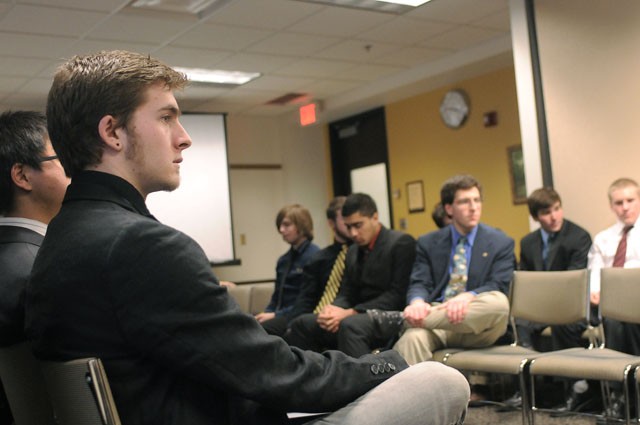The path to becoming a fraternity isnâÄôt quick.
For Phi Kappa Sigma, however, earning its colonization Saturday gets it one step closer.
The process, which usually takes about two years, began last spring for Phi Kappa Sigma, fraternity President Kevin Groenjes said.
The international chapter had been looking to restart a branch at the University of Minnesota after all Phi Kappa Sigma chapters folded as throngs of members were drafted into service in 1943 as the U.S. ramped up its involvement in World War II. Many returned to their respective campuses at the end of the war, but the group itself didnâÄôt return, said Doug Opicka, grand alpha of the international chapter.
Phi Kappa Sigma saw the University as a good place to start a chapter, because the Midwest is home to the largest concentration of chapters for the organization, Opicka said.
The UniversityâÄôs chapter, until Saturday, operated as an interest group in an exploratory phase during which the international chapter determined whether there was enough interest on campus.
In a ceremony Saturday, the group received its official colonization, and itâÄôs now recognized by the international branch.
To get there, the group had to submit biographies and academic information for all proposed members, meant to ensure the group meets the standards of the international chapter.
Phi Kappa Sigma is now vying for its charter with the international chapter.
Earning the charter involves learning the history and expectations of the organization, Opicka said.
The newly recognized fraternity must also work to establish a foundation with bank accounts, philanthropy, getting involved in the campus greek system and getting the word out, Opicka said.
Phi Kappa Sigma is an opportunity for those who either saw what happened this fall or heard the stereotypes of fraternities to start something different, Office for Fraternity and Sorority Life Director Chad Ellsworth said. He said people who want to aspire to a higher quality have a “neat opportunity.”
The group of 25 is looking to surpass 35 members, the average membership of current fraternities on campus, Groenjes said.
“Anytime that a group comes in and can recruit a good number of guys, like Phi Kappa Sigma has done, it certainly shows that thereâÄôs interest in new and different organizations that arenâÄôt here,” Ellsworth said.
A long-term goal for Phi Kappa Sigma is to create more unity in the greek community. Members have been working on this by reaching out to other fraternities and sororities on campus, Groenjes said.
ThereâÄôs a status quo among fraternities now thatâÄôs easy to “get lost” in, and joining Phi Kappa Sigma is a way to work toward changing that, said political science freshman Nate Schwab. He said he likes how when the group meets, members look at “how things are done now and how we can do things differently.”


